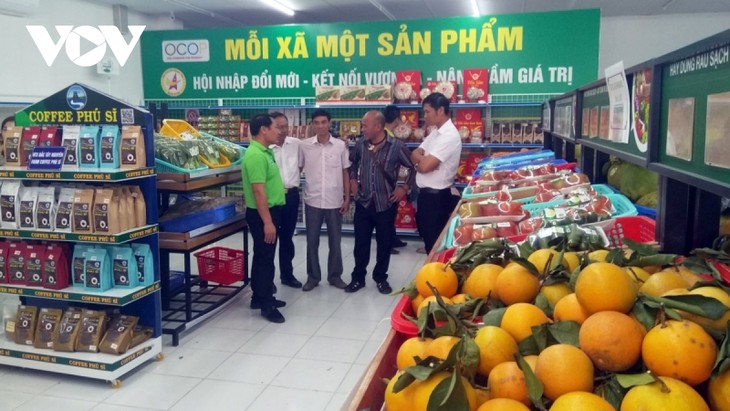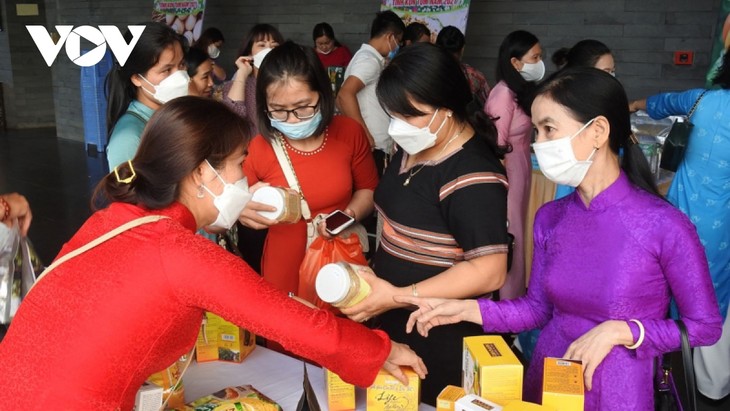(VOVWORLD) - The central highland province of Kon Tum developed 58 new OCOP products under Vietnam’s “One Commune – One Product” (OCOP) program last year, raising the locality’s total OCOP items to 146. Despite the COVID-19 pandemic, local authorities and producers have worked closely with each other to increase sales and income for the farmers.
 A showroom showcasing OCOP products in Kon Tum city A showroom showcasing OCOP products in Kon Tum city |
Dak Pxi commune in Dak Ha district is famous for its dried bamboo shoots with 12 tons sold to the market last year. At supermarkets, the product sells for 13 USD per kilo. Tet, Vietnam’s Lunar New Year festival, is the peak consumption period.
A Sao of Kon Pao Kla village says that, thanks to OCOP products, people in Dak Pxi commune have more income and better lives.
“In July local people began going to the forest to harvest bamboo shoots. To create a product qualified for export, we must peel the shoots and boil them soon after they’re harvested. They are then soaked in cold water, washed, split into pieces, and dried in the sun or over charcoal. Before packaging, unqualified pieces of bamboo shoot are sorted out. The more villagers earn from the dried bamboo shoots, the more responsible they feel for growing the shoots,” said Sao.
Last year, despite the COVID-19 pandemic, businesses, cooperatives, and business households in Kon Tum province developed 58 new OCOP items made from locally available materials, including Ngoc Linh ginseng, coffee, and fruit products.
Ho Thi Kim Oanh, Director of the Lam Thinh Trade and Production Company in Dak To district, told VOV, “When my company began to participate in the OCOP program, the competitiveness of our products was far behind other brands available in the market. After two years, our product designs have greatly improved. We’ve increased at least 50% in competitiveness, packaging design, and product quality. When our products are sold on e-commerce platforms like Shopee, they are rated equal to other products of the same type.”
By the end of last year, Kon Tum province had developed 146 OCOP products rated from three to five stars.
 OCOP products are introduced in Dak Ha district. OCOP products are introduced in Dak Ha district. |
To improve product value, special attention has been paid to marketing. Showrooms have been set up in Kon Tum city and Dak Ha district to introduce and sell OCOP products.
During the pandemic, OCOP producers have started doing business on e-commerce platforms like Lazada, Shopee, Sendo, and Tiki.
Luong Thi My Hue, Director of the Tay Nguyen Herb Company, attributes her business’s success to timely transformation.
“We had to find a new direction, because no trade promotion activities could be carried out due to the pandemic. We’ve put our products on e-commerce platforms like Tiki and Shopee, which has proved extremely effective,” said Hue.
Nguyen Quang Hoa, Deputy Director of the provincial Rural Development Sub-Department, said that his department has successfully connected businesses, cooperatives, and households with the e-commerce market.
He said, “Following the provincial Department of Agriculture and Rural Development’s advice, a working group has been established to direct production and coordinate sales of local farm produce. We’ve introduced all OCOP products to the Ministry of Agriculture and Rural Development and to e-trading channels for short-term and long-term consumption. All qualified products have been marketed to supermarkets.”
E-commerce has boosted OCOP product sales. Agricultural products no longer go unsold, which means local farmers will likely have a comfortable Tet.
Just ahead of the traditional Lunar New Year, eight more villages in Kon Tum have been recognized as new-style rural communes, bringing the province’s total to 36.